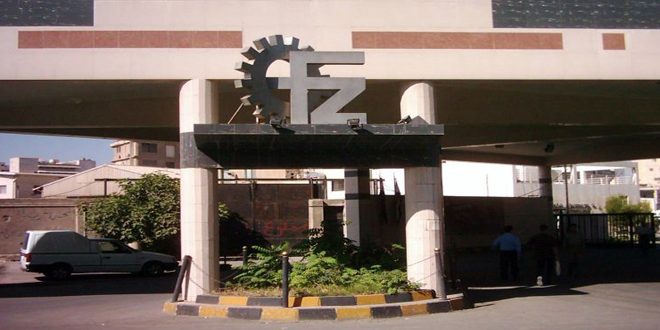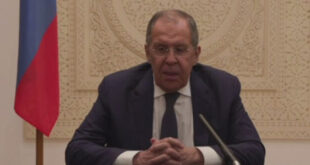Damascus, SANA- The revenues of the General Establishment for Free Zones have reached up to SYP 4.5 billion in the year 2019 while the capital invested in them reached USD 628 million in parallel with continuing the projects of rehabilitating their facilities and activating the economic activity in them, in addition to handling the situations of their investors, and finding solutions to overcome the unilateral coercive economic measures imposed on Syria.
Director of the Establishment Eyad Kousa, in a statement to SANA, said that the Establishment’s revenues reached SYP 4,504 million while the value of the goods which entered the free zones amounted to SYP 44 billion while the exported goods reached SYP 49 billion.
Kousa added that the invested capital at the free zones in 2019 was estimated at about USD 628 million and the number of investors hit 908 whose facilities provide jobs for 6,145 laborers, indicating that the amount of the achieved customs fees last year reached SYP 8,158 million.
He noted that the Establishment works on resuming activity at the free zones which have been negatively affected by the unilateral economic measures imposed on Syria through encouraging the transit and the trade exchange and establishing export industries or industries that meet the needs of the local market, in addition to providing job opportunities and achieving significant revenues.
Kousa said that the Establishment has worked on providing the basic goods permanently to meet the need of the local market, and the Iranian goods which are stored at the free zones benefit from the advantages and exemptions covered by the free trade agreement signed between Syria and Iran with the aim of enhancing trade exchange and transit.
The investment work at the free zone in Adraa has been also resumed after a hiatus due to the terrorist war as the damaged infrastructure has been rehabilitated and services have been provided for the investors, Kousa noted
Kousa pointed out to the decision to collect the fees which the establishment takes from investors in the Syrian Pound instead of the dollar or its equivalent according to the exchange rate set by the Central Bank of Syria (CBS) in order to support the Syrian Pound and reduce the demand on foreign currency.
Last year, new industrial investments such as the pharmaceutical industries and infant formula and others were also allowed to be established at the free zones in order to reduce the import of such materials.
Within the framework of simplifying procedures for dealing with investors, Kousa pointed to raising the value of raw materials of Syrian origin allowed to be entered from the local market for the benefit of industrial establishments at the free zones from SYP 5 million annually to SYP 50 million in order to support the production process and help secure the need of industrial investors in the Free Zones from local raw materials and stopping their import from abroad.
Kousa revealed a proposal on establishing and investing private free zones which the private sector will bear the costs of their establishment, adding that these private free zones will have a future role in supporting the national economy.
In Syria, there are 9 free zones distributed over the Syrian provinces as follows: two free zones in Damascus and two in Lattakia, and one free zone in each of Tartous, Aleppo, Hasaka, Homs, and Daraa, and they are distinguished by their presence in the main cities and near the ports, airports and land ports, which has made them regional distribution centers and gates to abroad.
Ruaa al-Jazaeri
 Syrian Arab News Agency S A N A
Syrian Arab News Agency S A N A

